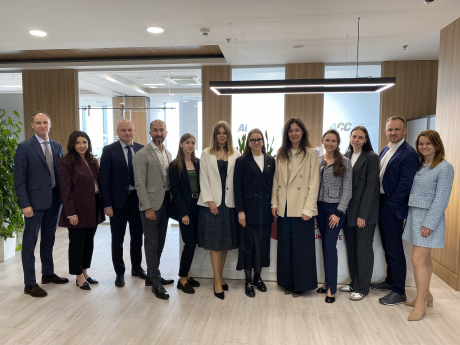The path to OECD Integrity Standards: is Ukraine ready for review?

UNIC, together with the OECD, continues to systematically conduct awareness-raising events for businesses – in particular, for business associations that play a key role in disseminating information about international anti-corruption standards among Ukrainian companies.
On April 29, 2025, UNIC, AmCham Ukraine, and the OECD co-hosted an event dedicated to corporate criminal liability for corruption – in the context of OECD standards implementation and the adoption of Law of Ukraine No. 4111-IX.
The event aimed to:
-
raise awareness of international anti-corruption standards,
-
discuss challenges and practical implications for businesses,
-
analyze the compliance of the newly adopted law with the OECD Anti-Bribery Convention.
Ivan Presniakov, Anti-Corruption Law Enforcement Analyst and Technical Assistance Project Manager for Ukraine within the OECD Anti-Corruption Network for Eastern Europe and Central Asia (ACN), explained the procedure for Ukraine’s accession to the OECD Working Group on Bribery in International Business Transactions.
He emphasized that joining this Working Group is a mandatory condition for acceding to the OECD Convention. However, the process is complex and multi-layered. To receive an invitation to ratify the Convention, a country must undergo an assessment of its legislative and law enforcement capacity, including:
-
the existence of effective and autonomous corporate criminal liability,
-
implementation of effective sanctions,
-
experience in investigating and prosecuting corruption crimes, including international legal assistance,
-
prohibition of tax deductibility for bribes.
“OECD evaluates not just the existence of a law, but its actual enforcement. Without effective corporate liability and real law enforcement practice, a country will not be invited to ratify the Convention. In this process, form cannot replace substance,” stressed Ivan Presniakov.
Lana Sinichkina, Partner at Arzinger Law Firm and Member of the UNIC Executive Committee, provided more details on the new law, underlining its importance but also its shortcomings in the context of OECD standards.
Key issues include:
-
Lack of autonomous corporate liability – currently, the law provides an overly narrow scope of cases for its application.
-
Ignoring domestic corruption – the law covers only bribery of foreign officials.
-
Absence of compliance obligations – despite international practice proving that compliance systems are crucial for prevention.
“We already see that this law will not achieve the desired effect unless necessary amendments are introduced. OECD will assess not only the fact of adoption but also the real enforcement. If we want reforms, we need to work on mechanisms, not create formalities,” summarized Lana Sinichkina.
UNIC calls on businesses and stakeholders to join the discussion and contribute to the development of effective mechanisms for implementing integrity standards. Harmonization with international requirements is not only Ukraine’s path toward the OECD but also a key to investor trust and sustainable development.
UNIC is grateful to the OECD partners for their support in preparing materials, their expertise, and their understanding of the importance of explaining these complex but critically important issues. Special thanks to AmCham Ukraine for openness to cooperation, efficient event organization, and an engaged audience. We also thank the speakers for their professional and insightful contributions, which helped bring Ukraine closer to real implementation of integrity standards in the business environment.




